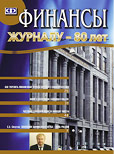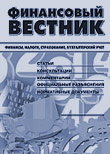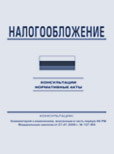Содержание
АКТУАЛЬНО
E-mail: finance-journal@mail.ru
В обзоре приведена информация о прошедшем 25.04.2024 в Москве XXXIII съезде играющего важную роль в развитии экономики России общественного объединения работодателей «Российский союз промышленников и предпринимателей» (далее – РСПП). С ключевым докладом выступил Президент РФ В.В. Путин, высоко оценивший роль РСПП и подчеркнувший важность сотрудничества государства и бизнеса для развития страны. Президент РФ обозначил конкретные шаги, направленные на обеспечение стабильных и предсказуемых условий для надежной, уверенной работы бизнеса. В работе съезда приняли заместители Председателя Правительства РФ, главы ключевых министерств. Министр финансов РФ А.Г. Силуанов затронул ряд важных вопросов, в том числе о справедливом налогообложении, создании стимулов для инвестиционной активности и др.
Ключевые слова:социальная ответственность бизнеса, справедливое налогообложение, социальное партнерство, национальные цели развития, 6-летний горизонт планирования, донастройка налоговой системы, налоговая амнистия за дробление бизнеса, технологический суверенитет.
НАЛОГИ: ТЕОРИЯ И ПРАКТИКА
В.Г. Пансков, профессор-исследователь кафедры налогов и налогового администрирования Финансового университета при Правительстве Российской Федерации, заслуженный экономист Российской Федерации, государственный советник налоговой службы I ранга, доктор экономических наук, профессор
E-mail: 5868116@mail.ru
Отмечая необходимость изыскания дополнительных, при этом весьма значительных финансовых ресурсов для повышения темпов роста российской экономики, автор подчеркивает важную роль налоговой системы в решении этой задачи, необходимость внесения в систему налогообложения страны серьезных качественных изменений. На основе анализа сложившейся демографической ситуации автор отмечает, что должна быть разработана государственная программа по стимулированию деторождения, созданию наиболее благоприятных условий для семей с детьми, а также по поощрению многодетности. При этом одно из ведущих мест в разделах данной программы следует отвести совершенствованию налогового механизма, который в настоящее время используется недостаточно и неэффективно.
Учитывая важность налоговых механизмов для решения социальных проблем общества, на которые обращено внимание в Послании Президента РФ В.В. Путина Федеральному Собранию, автором на основе анализа сложившейся ситуации, опыта зарубежных стран предложено в качестве инструмента прямого регулирования налоговой нагрузки для отдельных категорий налогоплательщиков введение специальных корректирующих коэффициентов, применяемых в отношении установленной законом налоговой ставки по НДФЛ.
Ключевые слова: демографическая ситуация, налоговая система, фискальная функция, регулирующая функция, налоговая нагрузка, налоговое стимулирование экономики, прогрессивная шкала, стандартный налоговый вычет, повышение качества жизни семей с детьми, поддержка рождаемости, понижающий коэффициент, повышающий коэффициент.
Е.А. Смородина, доцент кафедры финансов, денежного обращения и кредита Уральского государственного экономического университета, кандидат экономических наук
E-mail: smorodina_e@mail.ru
М.И. Львова, доцент кафедры государственного и муниципального управления Уральского государственного экономического университета, кандидат экономических наук
E-mail: lvova_usue@mail.ru
М.Н. Клименко, доцент кафедры финансов, денежного обращения и кредита Уральского федерального университета имени первого Президента России Б.Н. Ельцина, кандидат экономических наук
E-mail: 111111KLIM@rambler.ru
Базовый цифровой инструментарий уже давно освоен и имплементирован в реальную практику отечественными налоговыми ведомствами. Сегодня речь идет о переходе на совершенно новый уровень цифровизации – уровень интеллектуализации и роботизации. Концептуальным и технологическим ядром процессов перевода налоговой системы страны на интеллектуальные платформы выступает технология Big Data. В статье представлены пути цифровизации национальной налоговой системы. Приведен зарубежный и отечественный опыт внедрения аналитики Big Data в работу налоговых ведомств. Выявлены пути имплементации Big Data в налоговое администрирование и обозначены сопутствующие риски.
Ключевые слова: налоговое администрирование, налогоплательщик, big data, цифровизация, цифровая экономика.
ФИНАНСЫ И БЮДЖЕТ: ПРОБЛЕМЫ И РЕШЕНИЯ
Д.Ю. Землянский, директор Центра пространственного анализа и региональной? диагностики Российской академии народного хозяйства и государственной службы при Президенте Российской Федерации, научный сотрудник географического факультета МГУ имени М.В. Ломоносова, кандидат географических наук
E-mail: zemlyanskiy-dy@ranepa.ru
В.В. Климанов, директор Центра региональной политики Российской академии народного хозяйства и государственной службы при Президенте Российской Федерации, директор Института реформирования общественных финансов, доктор экономических наук
E-mail: vvk@irof.ru
В статье представлен анализ исполнения консолидированных бюджетов субъектов Российской Федерации в 2023 г. На основе проведенного исследования сделан вывод, что ситуация с региональными бюджетами оказалась достаточно устойчивой по итогам 2023 г. При этом повышенного внимания требует состояние региональных бюджетов регионов Северо-Западного и Северо-Кавказского федеральных округов.
Ключевые слова: региональные бюджеты, исполнение бюджетов, доходы и расходы бюджетов, государственные долг.
А.В. Фрыгин, начальник Финансового управления городского округа Щёлково Московской области, доцент кафедры общественных финансов Финансового университета при Правительстве Российской Федерации, кандидат экономических наук
E-mail: AVFryigin@fa.ru
М.Н. Прокофьев, доцент кафедры общественных финансов Финансового университета при Правительстве Российской Федерации, кандидат экономических наук
E-mail: MiNProkofev@fa.ru
В статье отражены актуальные проблемы открытости и прозрачности бюджетной системы. Рассматриваются подходы к развитию принципов открытости и прозрачности бюджетной системы как одного из направлений, отвечающего запросам общества. В качестве объекта исследования авторами выбран конкурс «Бюджет для граждан» который проводился в городском округе Щелково Московской области. В настоящее время ресурс «Бюджет для граждан» является наиболее распространенным и доступным для населения. Рассматриваются проблемы, связанные с предоставлением населению информации в понятной и удобной для восприятия форме. И здесь мы сталкиваемся с тем, что практика общественного участия в системе управления государственными и муниципальными финансами явно недостаточна. Были рассмотрены условия и примеры развития форм участия в системе управления государственными и муниципальными финансами в городском округе Щелково Московской области, предложены меры и механизмы, наиболее целесообразные с точки зрения бюджетного законодательства Российской Федерации.
В статье описывается реализация механизма обратной связи, привлечение населения к участию в бюджетных процедурах, повышение открытости и прозрачности государственных и муниципальных финансов.
Ключевые слова: принципы бюджетной системы Российской Федерации, открытость и прозрачность, местное самоуправление, бюджет для граждан, органы местного самоуправления, финансовые органы, государственные и муниципальные финансы, формы участия населения.
КАЗНАЧЕЙСТВО: СТАНОВЛЕНИЕ И РАЗВИТИЕ
Г.Ю. Корчагина, заместитель руководителя УФК по Камчатскому краю
E-mail: finance-journal@mail.ru
Казначейская система прошла длинный путь становления, усовершенствования, модернизации, образования системы управления государственными финансами с учетом потребностей настоящего времени, что позволяет применять разнообразные финансовые инструменты, которые сводятся к обеспечению исполнения и казначейскому обслуживанию исполнения бюджетов бюджетной системы, а также играет большую роль в развитии финансовой деятельности публично-правовых образований Российской Федерации, выполняя транзакционную, учетную, информационную функции.
Основной составляющей ее функций является обеспечение ликвидности и платежеспособности единого счета бюджета. В статье управление ликвидностью единого счета бюджета рассматривается на примере Камчатского края.
Ключевые слова: Камчатский край, Управление Федерального казначейства по Камчатскому краю, единый счет бюджета, ликвидность, временно свободные остатки средств.
МНЕНИЯ
Д.Н. Ершов, старший научный сотрудник Центра международных финансов Научно-исследовательского финансового института Минфина России, кандидат физико-математических наук
E-mail: ershov@nifi.ru
Предмет исследования – процессы формирования общего валютно-финансового пространства в рамках БРИКС в условиях трансформации системы международных отношений и создания нового полюса влияния на основе общей заинтересованности в этом стран – участниц объединения. В последние годы становится очевидной неспособность сложившейся валютно-финансовой системы соответствовать запросам по созданию многополярной системы безопасности и более справедливого миропорядка. Одним из важнейших элементов такой системы является снижение зависимости от доллара США, увеличение доли использования национальных валют в международных расчетах и создание единой расчетной единицы БРИКС на основе корзины валют. Цель работы – рассмотреть текущее состояние и перспективы формирования общего пространства и проанализировать основные трудности на этом пути. Рассмотрены некоторые важные аспекты создания сопутствующей инфраструктуры, которые обсуждаются в 2024 г. в рамках БРИКС под председательством Российской Федерации. Сделан вывод о том, что на среднесрочную перспективу актуальными становятся следующие задачи: 1. Повышение доли национальных валют в торговле между странами БРИКС. 2. Формирование единой расчетной единицы на базе валют стран-участниц. Их решение поможет в будущем приступить к созданию общей валюты БРИКС.
Ключевые слова: БРИКС, общая расчетная единица, дедолларизация, мировая валютно-финансовая система, Новый банк развития.
О.В. Хмыз, доцент кафедры международных финансов МГИМО МИД России, кандидат экономических наук, доцент
E-mail: khmyz@mail.ru
В настоящее время одним из наиболее инновационных сегментов отечественного финансового рынка является рынок цифровых финансовых активов (ЦФА) в токенизированной форме. В силу короткого времени самого его существования и неустоявшихся прецедентов представляется вполне своевременным проанализировать текущее состояние этого сегмента российского финансового рынка, систематизировать его преимущества и недостатки и оценить перспективы. Это и поставлено целью данной статьи. В работе выявлены проявившиеся за 2 года существования российского рынка ЦФА преимущества и недостатки. Перспективы инструментария ЦФА оцениваются обещающие, в том числе с учетом возможностей использования во внешних расчетах РФ в условиях санкций.
Ключевые слова: цифровые финансовые активы, ЦФА, финансовый рынок, токены, операторы информационных систем, операторы обмена ЦФА.
НАУЧНЫЕ ИССЛЕДОВАНИЯ АСПИРАНТОВ И СОИСКАТЕЛЕЙ
Д.М. Волков, руководитель отдела налогового планирования ООО «Купишуз» (Lamoda), аспирант Финансового университета при Правительстве Российской Федерации
Е-mail: 230363@edu.fa.ru
В условиях, когда НДС становится одним из ключевых источников пополнения государственного бюджета в странах ЕАЭС, проблема интеграции подходов к налоговому регулированию данного налога становится всё более актуальной. Одним из инструментов оценки степени интеграции является метод количественной оценки. Целями статьи являются разработка методологии расчета нового индекса, который показывает степень интеграции национальных систем НДС в странах ЕАЭС, а также анализ динамики указанного индекса, в том числе входящих в него показателей, за 2013–2022 гг. Предмет исследования – экономические показатели стран ЕАЭС, на которые оказывает влияние политика стран в области НДС. По результатам проведенного анализа сделан вывод, что несмотря на усиление степени интеграции в части НДС в странах ЕАЭС, указанное сближение подходов произошло, скорее, не за счет многолетней и последовательной гармонизации налоговой политики стран Союза, а по причине внешних обстоятельств, одним из которых стало начало специальной военной операции в 2022 г., что привело к переориентации внешней торговли России на страны ЕАЭС.
Ключевые слова: НДС, интеграция, ЕАЭС, конвергенция, индекс Франка, доля сальдо консолидированного бюджета, налогообложение потребления, коэффициент вариации, ЕЭК.
Content
TOPICAL
E-mail: finance-journal@mail.ru
The review provides information on the XXXIII Congress of the Russian Union of Industrialists and Entrepreneurs (RSPP), which plays an important role in the development of the Russian economy, held 25.04.2024 in Moscow. The key report was made by the President of the Russian Federation V.V. Putin, who highly appreciated the role of the RUIE and emphasized the importance of cooperation between the state and business for the development of the country.The President of the Russian Federation outlined concrete steps aimed at ensuring stable and predictable conditions for reliable, confident business operation. The congress was attended by Deputy Prime Ministers of the Russian Federation, heads of key ministries. Russian Finance Minister A.G. Siluanov touched upon a number of important issues, including fair taxation, creating incentives for investment activity, etc.
Keywords: social responsibility of business, fair taxation, social partnership, national development goals, 6-year planning horizon, adjustment of the tax system, tax amnesty for splitting business, technological sovereignty.
TAXES: THEORY AND PRACTICE
V.G. Panskov, research professor, Department of taxes and tax administration, Financial University under the Government of the Russian Federation, honored economist of the Russian Federation, state advisor to the tax service of the 1st rank, doctor of economics, professor
E-mail: 5868116@mail.ru
Noting the need to find additional, at the same time very significant financial resources to increase the growth rate of the Russian economy, the author emphasizes the important role of the tax system in solving this problem, the need to make serious qualitative changes to the country's taxation system. Based on the analysis of the current demographic situation, the author notes that a state program should be developed to stimulate childbirth, create the most favorable conditions for families with children, as well as to encourage large families. At the same time, one of the leading places in the sections of this program should be devoted to improving the tax mechanism, which is currently underused and inefficient.
Taking into account the importance of tax mechanisms for solving social problems of society, which are drawn attention to in the Address of the President of the Russian Federation V.V. Putin to the Federal Assembly, the author, based on an analysis of the current situation, the experience of foreign countries, proposed as a tool for direct regulation of the tax burden for certain categories of taxpayers the introduction of special corrective coefficients applied in relation to the statutory tax rate on personal income tax.
Keywords: demographic situation, tax system, fiscal function, regulatory function, tax burden, tax stimulation of the economy, progressive scale, standard tax deduction, improving the quality of life of families with children, birth support, lowering coefficient, increasing coefficient.
Е.A. Smorodina, associate professor of the Department of finance, money circulation and credit, Ural State University of Economics, сandidate of of eonomic sciences
E-mail: smorodina_e@mail.ru
М.I. Lvova, associate professor of the Department of public and municipal administration, Ural State University of economics, candidate of economic sciences
E-mail: lvova_usue@mail.ru
М.N. Klimenko, associate professor of the Department of finance, money circulation and credit, Ural Federal University named after the First President of Russia B.N. Yeltsin, candidate of economic sciences
E-mail: 111111KLIM@rambler.ru
Basic digital tools have long been mastered and implemented into real practice by domestic tax departments. Today we are talking about the transition to a completely new level of digitalization – the level of intellectualization and robotization. The conceptual and technological core of the processes of transferring the country's tax system to intelligent platforms is Big Data technology. The article presents ways to digitalize the national tax system. Foreign and domestic experience in introducing Big Data analytics into the work of tax departments is presented. The ways of implementing Big Data in tax administration are identified and the associated risks are identified.
Keywords: tax administration, taxpayer, big data, digitalization, digital economy.
FINANCE AND BUDGET: PROBLEMS AND SOLUTIONS
D.Yu. Zemlyansky, director of the Center for spatial analysis and regional coronavirus diagnostics of the Russian academy of national economy and public administration under the President of the Russian Federation, researcher, Faculty of geography, Moscow state university named after M.V. Lomonosov, candidate of geographical sciences
E-mail: zemlyanskiy-dy@ranepa.ru
V.V. Klimanov, director of the Center for regional policy of the Russian academy of national economy and public administration under the President of the Russian Federation, director of the Institute for the reform of public finance, doctor of economics
E-mail: vvk@irof.ru
The article presents an analysis of the execution of the consolidated budgets of the constituent entities of the Russian Federation in 2023. Based on the study, it was concluded that the situation with regional budgets turned out to be quite stable by the end of 2023. At the same time, the state of regional budgets of the regions of the North-West and North Caucasian federal districts requires increased attention.
Keywords: regional budgets, budget.
A.V. Frygin, head of the Financial department of the Shchelkovo city district of the Moscow region, associate professor of the Department of public finance of the Financial University under the Government of the Russian Federation, candidate of economic sciences
E-mail: AVFryigin@fa.ru
M.N. Prokofiev, associate professor, Department of public finance, Financial University under the Government of the Russian Federation, candidate of economic sciences
E-mail: MiNProkofev@fa.ru
The article reflects the current problems of openness and transparency of the budget system. Approaches to the development of the principles of openness and transparency of the budget system as one of the directions that meets the needs of society are considered. The authors chose the "Budget for Citizens" competition, which was held in the Shchelkovo urban district of the Moscow Region, as the object of research. Currently, the Budget for Citizens resource is the most widespread and accessible to the population. Problems associated with providing the population with information in an understandable and easy-to-read form are considered. And here we are faced with the fact that the practice of public participation in the management system of state and municipal finances is clearly insufficient. Conditions and examples of the development of forms of participation in the state and municipal finance management system in the Shchelkovo urban district of the Moscow region were considered, measures and mechanisms were proposed that are most appropriate from the point of view of the budget legislation of the Russian Federation.
The article describes the implementation of the feedback mechanism, attracting the population to participate in budget procedures, increasing the openness and transparency of state and municipal finances.
Keywords: principles of the budgetary system of the Russian Federation, openness and transparency, local self-government, budget for citizens, local governments, financial bodies, state and municipal finances, forms of participation of the population.
TREASURY: FORMATION AND DEVELOPMENT
G.Yu. Korchagina, deputy head of the UFK in the Kamchatka Territory
E-mail: finance-journal@mail.ru
The treasury system has come a long way in the formation, improvement, modernization, formation of the public finance management system, taking into account the needs of the present time, which makes it possible to use a variety of financial instruments, which boil down to ensuring the execution and treasury services of the budget system, and also plays a large role in the development of financial activities of public legal entities of the Russian Federation, performing transactional, accounting, information functions.
The main component of its functions is to ensure the liquidity and solvency of the single budget account. In the article, liquidity management of a single budget account is considered on the example of the Kamchatka Territory.
Keywords: Kamchatka Territory, Office of the Federal Treasury for the Kamchatka Territory, single budget account, liquidity, temporarily free balances of funds.
OPINIONS
D.N. Ershov, senior researcher, Center for international finance, Research financial institute of the Ministry of Finance of Russia, candidate of physical and mathematical sciences
E-mail: EADombrovskij@fa.ru
The subject of the study is the formation of a common monetary and financial space within the BRICS framework in the conditions of transformation of the system of international relations and the creation of a new pole of influence based on the common interest of all member countries of the association. In recent years, the inability of the existing monetary and financial system of relations to meet the demands for creating a more equitable multipolar security order has become obvious. One of the most important elements of such a system is to reduce dependence on the dollar, increase the share of the use of national currencies in international payments and create a single BRICS unit of account based on a basket of currencies. The purpose of the work is to consider the current state and prospects for creating a common space and analyze the main difficulties along this path. Some important aspects of creating related infrastructure are considered, which are discussed in 2024 within the framework of BRICS under the chairmanship of the Russian Federation. It is concluded that two tasks become relevant in the medium term: 1. increasing the share of national currencies in trade between the BRICS countries and 2. forming a single unit of account based on the currencies of the participating countries. Solving these problems will help in the future to begin the formation of a common BRICS currency.
Keywords: BRICS, common unit of account, de-dollarization, global monetary and financial system, New Development Bank.
O.V. Khmyz, associate professor, Department of international finance, MGIMO, Ministry of foreign affairs of Russia, candidate of economic sciences, associate professor
E-mail: khmyz@mail.ru
Currently, one of the most innovative segments of the domestic financial market is the digital financial assets (CFA) market in tokenized form. Due to the short time of its very existence and unsettled precedents, it seems quite timely to analyze the current state of this segment of the Russian financial market, systematize its advantages and disadvantages and assess the prospects.This is the purpose of this article. The work revealed the advantages and disadvantages that have manifested themselves over the 2 years of the existence of the Russian CFA market. Promising prospects for the CFA toolkit are assessed, including taking into account the possibilities of using the Russian Federation in external calculations under sanctions.
Keywords: digital financial assets, CFA, financial market, tokens, information system operators, CFA exchange operators.
SCIENTIFIC RESEARCH OF POSTGRADUATE STUDENTS AND POSTDRADUATE DEGREE SEEKERS
D.M. Volkov, head of the Tax planning Department of Kupishuz LLC (Lamoda), graduate student of the Financial University under the Government of the Russian Federation
Е-mail: 230363@edu.fa.ru
With VAT becoming one of the key sources of replenishment of the state budget in the EAEU countries, the problem of integrating approaches to tax regulation of this tax is becoming more and more urgent. One of the tools for assessing the degree of integration is the quantitative assessment method.The objectives of the article are the development of a methodology for calculating a new index, which shows the degree of integration of national VAT systems in the EAEU countries, as well as an analysis of the dynamics of this index, including the indicators included in it, for 2013-2022. The subject of the study is the economic indicators of the EAEU countries, which are influenced by the policies of the countries in the field of VAT. According to the results of the analysis, it was concluded that despite the strengthening of the degree of integration in terms of VAT in the EAEU countries, rather, this convergence of approaches was not due to the long-term and consistent harmonization of the tax policy of the countries of the Union, and due to external circumstances, one of which was the beginning of a special military operation in 2022, which led to the reorientation of Russia's foreign trade to the EAEU countries.
Keywords: VAT, integration, EAEU, convergence, Frank index, share of consolidated budget balance, consumption taxation, coefficient of variation, EEC.











